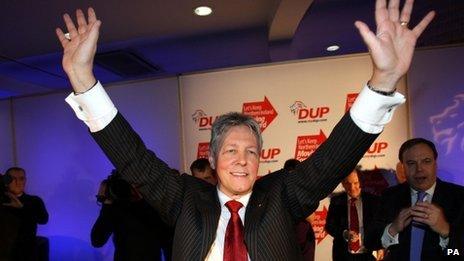DUP lion still roaring in Northern Ireland's political jungle
- Published

Peter Robinson accepts the applause following his speech at the DUP conference on Saturday
The lion is the symbol of the DUP.
Judging from the attendance at this year's annual conference and its poll-topping performance in the assembly elections back in May, there's no doubt the DUP is king of Northern Ireland's political beasts.
But is it a fierce wild cat or a purring pussy cat? Ask former DUP MEP Jim Allister and current Stormont finance minister Sammy Wilson and you get radically different answers.
Last weekend, Mr Allister, now the Traditional Unionist Voice leader, told his TUV supporters that Sinn Fein had tamed the DUP lion and turned it into a roll-over pussy cat.
This weekend, Mr Wilson replied that the DUP lion could still roar and still bite - citing the slap down administered by Peter Robinson to the justice minister David Ford over diluting British emblems in the Prison Service as evidence the DUP has not lost its teeth.
Lion or moggy - will the real DUP stand up?
The softer side of the party was on show in their election broadcast, devoted to service charities, or Social Development Minister Nelson McCausland's emphasis on the need to demonstrate compassion to the homeless.
The more abrasive edge was evident in the DUP deputy leader Nigel Dodds' assault on the party's opponents, and Sammy Wilson's knockabout performance, which included a near the knuckle joke, external likening the babies in a creche at the Sinn Fein Ard Fheis to IRA hunger strikers and dirty protestors.
Apart from a jibe at the expense of the BBC's Stephen Nolan, the bulk of the DUP leader Peter Robinson's speech fitted into the softer more inclusive mode.
Mr Robinson looked forward to an end of the days of "them and us" politics.
He seemed to banish the DUP's "no surrender" stance to the dustbin of history and positioned the party as "persuaders" eager to convince floating Catholic voters of the benefits of remaining in the UK.
Recruitment
A reasonable aspiration perhaps, although it would be interesting to discover what pro-union Catholics might make of the flag waving in the conference hall, or the DUP leader's recent threat to resign over any threat to the prison service's British identity.
Mr Robinson's aim is to extend the DUP's reach not just towards Catholic unionists but also to others who might so far have been reluctant to get involved in politics.
So he talked about recruiting "registered party supporters".
DUP sources said these could include civil servants or police officers, people currently prevented from playing an active role in politics.
As with other parties in Northern Ireland, the DUP invited members of various professional and voluntary groups to join them in their conference discussions.
On the way out, one lobbyist told me he believed the party was "streets ahead" of its rivals in seriously engaging with such groups on many policy matters.
All this can be seen as part of the DUP's aim - spelled out at previous conferences - of making itself "the party of Northern Ireland".
But will the future Northern Ireland be a pluralist place with debate between various views or a DUP/Sinn Fein duopoly?
There seemed to be different messages on this score, with Peter Robinson talking about the need to develop an open honest opposition at Stormont, whilst both Nigel Dodds and Sammy Wilson were scornful of those they accused of flirting with "opposition for opposition's sake". (Mr Wilson adapted the acronym NEETs to refer to the Ulster Unionists as, potentially, "Not in the executive or even trying")
The DUP leader insists there's no contradiction, but you wonder if the party really only wants an opposition because otherwise there would be no-one left to be the butt of its jokes at future annual conferences.
Lion or pussy cat? Well a bit of both.
In the short-term, there's no sign of the DUP's place in the pecking order of the Stormont political jungle being usurped, with its major challenges more likely to be posed by economic and political developments elsewhere in the UK or Europe rather than any radical change in the balance of power closer to home.
- Published26 November 2011